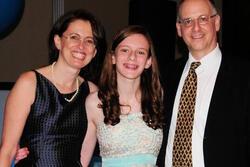My Menstruation, Myself
Image of a pad, with a red glitter background. The original image, and other body and sex positive images can be found at At the Well's Instagram.
We recently did an interview with Sarah Waxman, the founder of At The Well, a Jewish women’s organization that seeks to bring women together “at the intersection of wellness and Jewish spirituality.” At The Well works to normalize menstruation and encourage women’s conversations about their health. To that end, we at JWA decided to have an informal group chat about menstruation, our bodies, and sex. There was chocolate, honesty, and lots of laughter. Although we represent different ages and family backgrounds, we found plenty in common around this very normal (and under-discussed) topic.
To protect the identities of our uteruses, and to provide a safe space for each person to share freely, we decided to each pick a badass Jewish woman from the archive, whose story resonated with us.
Lillian Wald: Let’s talk periods!
Rose Schneiderman: I got my period when I was 12. My mom slapped me. It’s a thing.
Barbara Myerhoff: It’s a Jewish thing!
RS: It’s a Jewish thing. Yeah, I don’t really get it, but it’s fine, and it wasn’t violent.
BM: I first learned about menstruation from my father.
Gertrude Stein: Really?! In what context?
BM: My mother got really mad one day and stormed out of the room, and my father “explained” that she wasn’t legitimately upset, she was just on her period. Then he told me it would happen to me too. This was the first time I was hearing about menstruation, and it was conveyed through a reductive and sexist lens.
Bella Abzug: My dad is also the one who taught me about my period! He was a doctor and the whole thing was super medical and detached. I was eight, and started warning my friends to be careful because soon our uterine lining would be contracting. I definitely got the message that periods were taboo, but it came from my mom, who even now has a very “Don’t ask, don’t tell” kind of policy when it comes to menstruation and sex.
BM: Yeah, after learning about menstruation from my dad while my mother avoided the issue, I was determined that my daughter would never learn about her period that way. I tried to make talking about periods an ongoing dialogue with her, rather than that classic, uncomfortable, one-time-and-you’re-done sort of discussion. There’s so much room for making learning about this inevitable female experience a positive thing!
GS: Right? It’s like: “welcome to this part of your life, get excited!” It shouldn’t be like dragging you over the border of childhood and ‘tween.
BA: That’s definitely how it should be. So much of women’s learning about menstruation seems to happen when you’re alone, in a bathroom, scared. That’s what happens when women don’t tell their stories together, right? (Agreement around the table)
BM: My daughter and I have a really open relationship, but we part company when it comes to tampons. She refuses to wear them––and then says “I can’t go swimming, I can’t go to the beach, I can’t do this, I can’t do that, I have my period”––and I just keep wanting to tell her “sweetie, tampons gonna set you free!” But I can’t force that on her, and I have to respect that she’s choosing something different.
LW: I am afraid of tampons too! I had trouble getting my first tampon in. It took me a long time because––as awesome as my mom was––no one told me that the first step to putting a tampon in is figuring out where your vagina is, which should be obvious but it’s not. (Everyone around the table nods) I had a lot of trouble putting in a tampon, and then I had even more trouble getting the tampon out. I’ve been afraid of tampons ever since that first experience, even though my body is way different now, and I’m more comfortable.
GS: Clara, what’s your period experience been like? Do you remember when you first got yours?
Clara Lemlich Shavelson: Oh, yes: It was the same week as 9/11.
GS: Classic! (Laughter)
CLS: My mom had told me when I was eight. She did the traditional sit-down, “This is what’s going to happen. Here’s a book. Okay, I’m gonna run away now.” And I didn’t use tampons at first, because my mom told me that I was too young and that it was not appropriate, which was weird. But the next year my mom decided that it was okay, because my period has always come at inopportune times, like if I’m going on a beach vacation, you better believe my period’s gonna come right at the beach. We were in Maine for a week, and of course my period came, and I couldn’t swim, and my mom said, “Okay I guess it’s appropriate now for you to use tampons.”
I think that the biggest problem for me, in terms of women’s health, has been judgmental female doctors. I think they really try to police young girls. There is still this old-fashioned idea that sex is automatically degrading to young women and we should all be thinking about, you know, more “responsible” decisions. There is also this huge assumption that if you are sexually active, it is with male partners.
GS: Yeah, from my own experience, going to the gynecologist as a lesbian is uncomfortable! Like you said, the default assumption is that you are having sex with men. There are certain procedures and tests that they do for me that they don’t necessarily need to do. And there are pictures of babies on the walls. It makes me uncomfortable because I feel like I’m looked at as just a vessel to carry babies.
LW: Speaking of babies, I was a pretty young teen when I first went to the gynecologist because I wasn’t getting my period. They said “we have to do a pregnancy test” even though I knew I wasn’t pregnant. They were like “we know, we know, we’re sure you’re not lying but we have to do a pregnancy test.” Of course, I let them do it because the doctor is “In Charge.” Now, every time they do pregnancy tests on me without telling me specifically what they’re testing for, I feel like my privacy is being invaded. They should trust me.
RS: I guess I had my first OB/GYN experience pretty late. It was when I was 19 and I wanted to start birth control. I was on the pill for about eight years, and only recently switched to the copper IUD. Now, for the first time in eight years, I’m having a “natural” period. And I think the pill actually depressed my sex drive, but I didn’t realize it because I had only had sex while I was on it. It’s kind of a bummer to be just now learning about this part of myself so many years into being sexually active, but also kind of awesome to be learning it at all.
CLS: The pill sucked for me too! I’ve had my IUD for about five years, so I guess I was an early adopter. That was right when IUDs were starting to become big for younger women and I remember I told my mom about it and she was really surprised.
LW: Because originally, the IUD was for women who had had babies.
CLS: Yeah, my mom was like, “they want to put what in you?”
LW: And you were like, “you don’t know what’s been in me, mom.” (Laughter)
BA: Haha, yeah. “I’ve traveled Europe. I use tampons now. I’ve lived a life!”








My mother was brilliant. As A result, I looked on my period as proof of my womanhood and my fertitlity. I was very ill at one time and my period stopped.
I welcomed its return as proof of my renewed health.